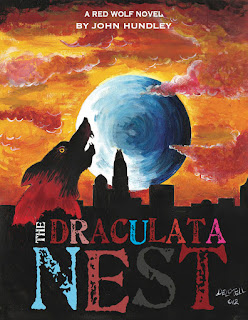The Cure For Writer's Block
Hey, folks. Wow, it's been about three weeks since I posted anything. But during my hiatus, I finished up the first half of my next novel and sent it off to my editing team, so it was time well spent. Thanks for your patience. It's good to be back.
So, having spent time overcoming some of it myself, now might be a good time to talk about a topic near and fear (not a typo) to my heart... writer's block!
The Draculata Nest -----------------------------------------------------------------------
So, having spent time overcoming some of it myself, now might be a good time to talk about a topic near and fear (not a typo) to my heart... writer's block!
What is it?
If you look up writer’s block on Wikepedia, you
get “a condition, primarily associated with writing as a profession,
in which an author loses the ability to produce new work.” On a grand scale, this
can be a career-ending and character debilitating. Perhaps you’ve run out of
ideas, or every idea you come up with falls well short of the last work you
published, which was well-received. You find yourself spending all your time
coming up with excuses for not producing. Finally, you just give up.
Yikes.
So far, that hasn’t happened to me (unless you
count the decades I spent “working up the nerve,” which you probably could). I
have a long list of ideas – I’m not saying they’re all good – that could never
be exhausted in the short time I have left on this earth. And, I’m pretty
secure in the perspective I have on my own writing that it is steadily
improving.
But, if I ever suffer from such an extreme
manifestation of writer’s block, I bet it will be caused by the same things
that plague me on a daily basis and that plague many other writers I’ve talked
to.
We’ve got the idea. We’ve got the characters. We
may even have an outline for our story. Yet, after finding a few precious hours
to write, away from the thousand other obligations in our lives, we stare at
the blank screen of our laptops, our fingers poised over the keyboard as the
time ticks away. And nothing gets done. We’re stuck.
What causes it?
There are three things that cause the kind of blocks
I’m talking about, and they’re the same things that make us unable to
accomplish other things we want to in our lives. They are fear, impatience, and perfectionism.
“Fear
is the mind-killer.” Remember how Paul Atriedes used to recite this litany in Frank
Herbert’s classic sci-fi novel, Dune?
It’s true. When we dwell on the possibilities of failure (or even success), our
minds are frozen into inactivity.
Impatience
makes
us want the end result without taking the necessary action. It causes
frustration, raises blood pressure, and sometimes makes us take a short cut we
know will lead us in the wrong direction. It might even lead us to give up.
Perfectionism
is
really a specific form of fear. We want what we write to be the best, and god
forbid it fall short of the perfection we strive for. So the lines we have in
our heads are never good enough to put on the page, and therefore they never
get there.
What to do about it…
Stay in
the moment. It
is the key to conquering fear. It is the cure for impatience and perfectionism.
When you are in the moment, there is no past to regret, no future to be afraid
of. There is only the now, and now is the only time we ever get anything done.
Staying in
the moment conquers fear. Fear comes from what might happen in the future, and in the
moment there is no future.
Staying in
the moment dissolves impatience, because we aren’t concerned with our
destination, only with where we are right now.
Perfectionism
cannot exist in the moment. We cannot strive to be what we already are.
It wasn’t until I developed the ability to stay
in the moment that I ever achieved any success in writing. It’s the single
skill I have to thank for being able to finish a project I’ve started, and when
I get stuck, it’s the thing I fall back on first to get myself unstuck.
A valuable exercise I use regularly is to ask
myself the question, what is my character
feeling right now, and how is he/she reacting to it? That not only puts me
in the moment, it puts my character there, too. You see, I may or may not know
where my character is supposed to end up in the scene, but I can’t write about
that. I can only write about what’s going on now, in the moment.
So, I write about how my character feels. I
write about how my character reacts. Before I know it, my character has taken
some action, and it is written down.
Okay, so those are all the wise words I have
today. I’d tell you what’s coming up next week, but I’m staying in the moment. J Until then, Happy
Reading!
But
Master..., you
might say.
Hush,
young Grasshopper, I
reply, leave it in a comment below.
...after you've checked out the first two Red Wolf novels, enjoying an average reader rating on Amazon of 4.45 out of 5 stars!
The Draculata Nest -----------------------------------------------------------------------
Click on the link to order:
ebook for Kindle in Paperback
ebook for Nook in Charlotte
ebook for Kobo Smashwords
ebook for Kindle in Paperback
The Dragon of Doughton Park ----------------------------------------------------------
Click on the link to order:
ebook for Kindle in Paperback
ebook for Nook in Charlotte
ebook for Kobo Smashwords
ebook for Kindle in Paperback









Hey, John. It's good to hear from you. No worries about the weeks you've been away. I've been on a month-long blog book tour, so I haven't exactly been around much either.
ReplyDeleteI can't say that I know much about writer's block. Considering that I have so little time each day to spend on this budding career, I can only begin a writing project once every year and a half or so. That usually gives me plenty of time to allow for a story idea to percolate.
Have a good week.
-Jimmy
Yeah, Jimmy, I'm in much the same boat. So little time, so many plot lines. The mini-blocks described above are pretty infrequent, and staying in the moment usually unblocks me quickly enough. Hope your blog tour produces results!
Delete-John